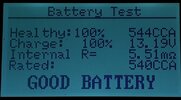- Joined
- 7 Sep 2022
- Messages
- 4,408
- Reaction score
- 1,260
- Country

If I ran a garage and was presented with a car battery at 0v, I'd replace it regardless what a tester said, unless the person dropping it off signed a waiver acknowledging that my recommendation was replace but their intention was to charge and use it against advice to the contra
Sometimes garage owners won't want to line themselves up for being blamed/badmouthed because "they charged my daughter a fortune to change the alternator and they still didn't fix the problem" when the complainer quietly omits the fact that the mechanic told them the battery was shagged but they opted out of replacing it..
It's fairly universally accepted that a lead acid cell discharged to 0v will not recover its former capacity no matter when you catch it - and i think you've even managed to determine that this battery is well ruined from your own testing. Might start a car all summer but just when daughter needs it in the first day of a new job, mid winter when it's persisting it down at the motorway services..
Sometimes you buy the peace of mind and willingness for someone else taking liability. If the old battery screwed the new alternator up would you be back insisting it be fixed on their dime? Quite sure you wouldn't but there are an unscrupulous minority who would, they being the crows we must fly with, and be shot with
Sometimes garage owners won't want to line themselves up for being blamed/badmouthed because "they charged my daughter a fortune to change the alternator and they still didn't fix the problem" when the complainer quietly omits the fact that the mechanic told them the battery was shagged but they opted out of replacing it..
It's fairly universally accepted that a lead acid cell discharged to 0v will not recover its former capacity no matter when you catch it - and i think you've even managed to determine that this battery is well ruined from your own testing. Might start a car all summer but just when daughter needs it in the first day of a new job, mid winter when it's persisting it down at the motorway services..
Sometimes you buy the peace of mind and willingness for someone else taking liability. If the old battery screwed the new alternator up would you be back insisting it be fixed on their dime? Quite sure you wouldn't but there are an unscrupulous minority who would, they being the crows we must fly with, and be shot with
Last edited:

